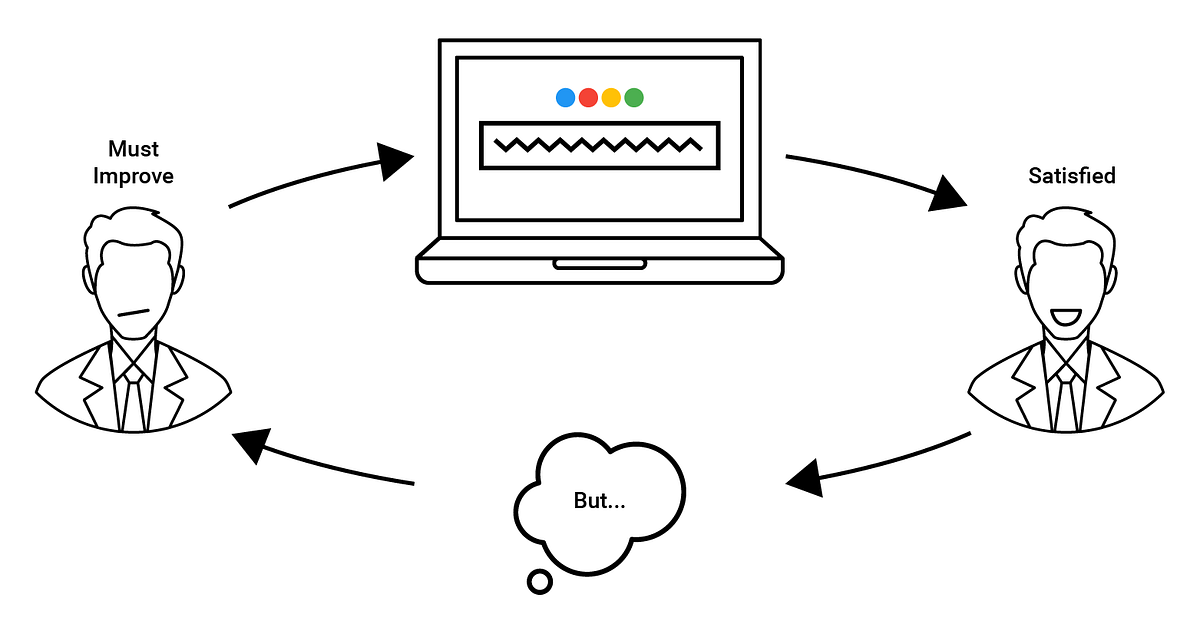The incessant need to find the best
How optimizing for every single thing can lead to ultimate sadness
There’s a phenomenon that is likely only found in the first world. I’m not sure if any psychologists, linguists, or anthropologists have coined a term for this behaviour, but it has four essential components:
- A desire to solve a need with a quick search
- The inability to accept the results of the search as sufficient
- Multiple subsequent desires to solve a need with a quick search
- Disappointment at all the results
Here’s an example of how that experience flows:
1. A desire to solve a need with quick search
You realize you need something — say an app to make quick GIFs out of screen recordings — so you begin with the standard Google search.

Great! Now you have a full list of results to satisfy your needs, and the first option seems like a perfectly good one, except… What if there’s better and this first option is simply the one with the best SEO?

2. The inability to accept the results of the search as sufficient
We start scrolling up and down in the search results, but that’s not very satisfying, because how do we know that what we personally choose is actually the best? What if someone knows better?

This search will bring us to another set of results that’s equally dissatisfying except now that we used an adjective Google will serve us an ad. Excellent.

3. Multiple subsequent desires to solve a need with a quick search
Unsatisfied with the ad, we start scrolling again except this time, tab hell begins.

Although this journey should have honestly ended after the first Google search, we continue to move aimlessly between these tabs assessing their contents as we get more and more paralysed by the infinite amount of choices that we have before us.
This last phenomenon shares a lot with what has now become recognised as the paradox of choice, and there has been both a book and a TED Talk about it so it’s not nothing new.

We have enough understanding of the human brain now to realize that we are happier when we have less choices in things that actually don’t matter. A good study from one of those TED Talks features consumers who are presented with two jam choices and another group that is presented with four, the ones that chose one jam out of two were happier than those that chose one jam out of four.
There are even ways to curb this dilemma, such as choosing the first parking in a parking lot regardless of how far it is from the entrance. This saves you both time and mental energy which ultimately will make you happier. You can imagine how if that logic was applied to our futile search for “gif screen recorder mac,” we would have saved a lot of time and energy.
While these are related to the behaviour that I’m talking about, they don’t quite capture the entirety of it. This relentless Googling and optimizing for the best of something that is incredibly banal is to me a brand new behaviour that has arisen particularly with the dawn of the internet.
Rather, the paradox of choice seems to be the masochistic end goal of this.
4. Disappointment at all the results
When the first search starts, you’re typically asking yourself “Does this specific thing that I need exist?” When the search comes back with a link that makes sense, the answer is “Yes” and there is a sudden spike of happiness.

Then all of a sudden you realize “Wait, this is the internet, so it can’t be the only option.”

This is the beginning of the feelings of disappointment and self-anguish, but it’s immediately followed by another uptick in emotions with the thought that “More options are just a search away!”

Once we get all those results, we’re suddenly incredibly overwhelmed and the first serious dip in happiness occurs. “How the *@#$ am I going to know which of these is the best?”
Here begins the grand opening of all the tabs with a tiny spike of happiness every time a tab loads, followed by the disappointment of there being more tabs.

As you can see above, the last point is a bit of a final spike in happiness which is the moment when you finally make a selection. It’s followed by a very sudden crash, or what we call “buyer’s remorse” which is the sense of regret we get after buying something. Even though we haven’t paid for anything, we’ve been exposed to so many choices that we can’t possibly be ultimately happy or satisfied with what we chose.
Perhaps an appropriate term for this is destructive optimisation. It’s the human’s inability to be satisfied with anything, even when it doesn’t matter. This goes beyond the simple adage of the grass being greener on the other side. It would be more akin to looking for the greenest grass and then when you’ve finally found it, you end up asking yourself whether or not this shade of green is greener than another shade.
Join the product and design professionals reading Noteworthy to understand the ideas and people that shape the products we use every day (and get an early peak at our product!).
If you have thoughts to share, we accept post submissions!
This article was actually written as a tangential train of thought that came to me while I was writing a short piece about the glory of the existence of the door knob museum. I originally wanted to make GIFs for that article but ended up looking for a recorder for 30 minutes. I never ended up making GIFs for it.
